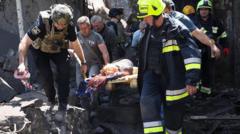Recent developments in the ongoing U.S.-Ukraine negotiations highlight significant challenges as officials attempt to resolve the protracted conflict with Russia.
# U.S.-Ukraine Cease-Fire Talks Hit Snags as Zelensky Rejects Key Proposal

# U.S.-Ukraine Cease-Fire Talks Hit Snags as Zelensky Rejects Key Proposal
Secretary of State Marco Rubio's absence from upcoming talks raises concerns about future negotiations amid Ukraine's outright dismissal of U.S. terms on Crimea.
The escalating tensions surrounding cease-fire discussions were underscored on Tuesday when Secretary of State Marco Rubio announced he would skip the next phase of talks. This news came alongside Ukrainian President Volodymyr Zelensky’s firm rejection of a major proposal by President Trump regarding the recognition of Crimea. While U.S., European, and Ukrainian negotiators are set to convene in London on Wednesday to refine a potential cease-fire agreement, the absence of Rubio and the objection from Zelensky cast uncertainty on the viability of reaching an accord.
Rubio had previously participated in a meeting in Paris aimed at advancing the peace process but expressed concerns that Trump's patience was waning, indicating the administration might shift focus to "other priorities." During the Paris talks, negotiators were briefed on the Trump administration's cease-fire framework. This proposal imposes prerequisites that Ukraine acknowledge Russia’s annexation of Crimea and explicitly rules out NATO membership for Ukraine.
Zelensky, addressing the media on Tuesday, reiterated Ukraine’s stance that discussions with Russia could only commence post-ceasefire and firmly ruled out any legal recognition of Crimea's annexation. “Ukraine will not legally recognize the occupation of Crimea,” Zelensky asserted during a press conference. “There’s nothing to talk about here. This is against our Constitution.”
The unfolding events reflect deepening complexities in the quest for peace and underlines the hurdles negotiators must overcome to bring an end to the conflict that has continued for over three years.
Rubio had previously participated in a meeting in Paris aimed at advancing the peace process but expressed concerns that Trump's patience was waning, indicating the administration might shift focus to "other priorities." During the Paris talks, negotiators were briefed on the Trump administration's cease-fire framework. This proposal imposes prerequisites that Ukraine acknowledge Russia’s annexation of Crimea and explicitly rules out NATO membership for Ukraine.
Zelensky, addressing the media on Tuesday, reiterated Ukraine’s stance that discussions with Russia could only commence post-ceasefire and firmly ruled out any legal recognition of Crimea's annexation. “Ukraine will not legally recognize the occupation of Crimea,” Zelensky asserted during a press conference. “There’s nothing to talk about here. This is against our Constitution.”
The unfolding events reflect deepening complexities in the quest for peace and underlines the hurdles negotiators must overcome to bring an end to the conflict that has continued for over three years.





















